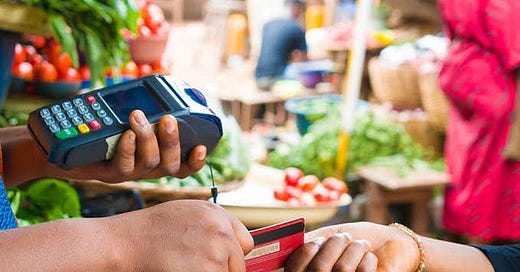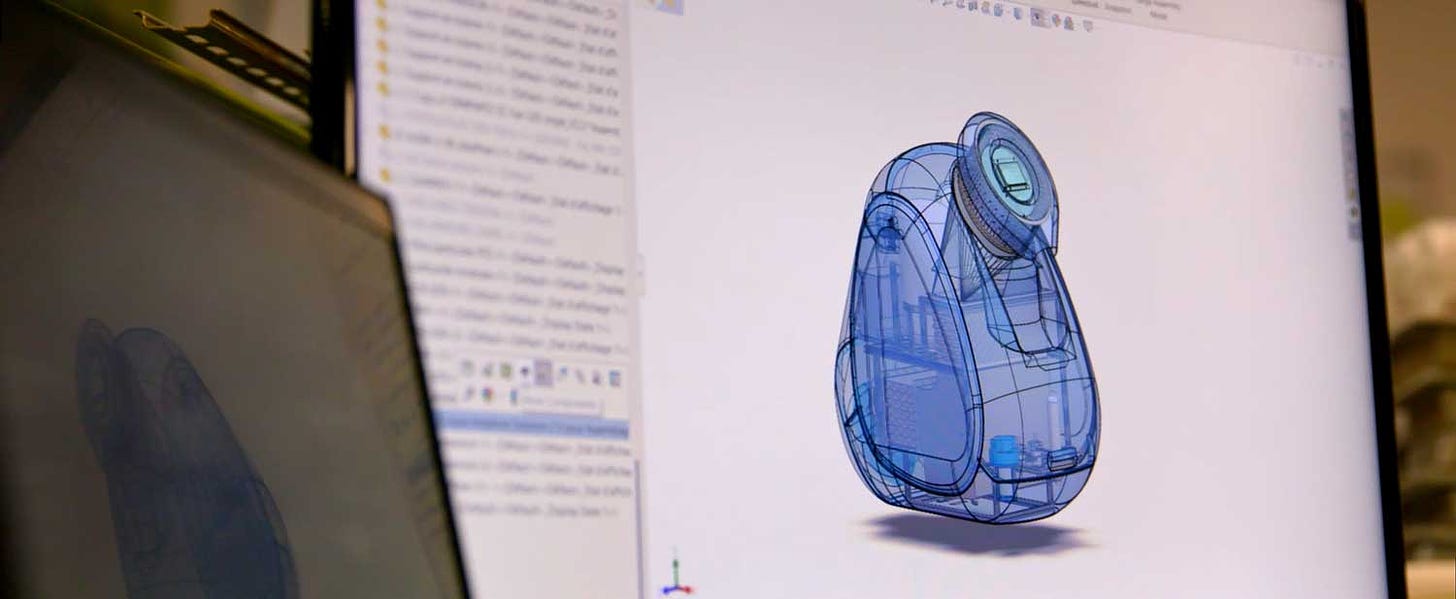The Briefing: UK Stops ‘Active Recruitment’ Of Health Workers From Nigeria
There must be no active international recruitment from countries on the red list
Greetings!
Sure you had a good and well-rested Easter break.
Africa's tech and startup scene is facing a number of challenges this season. KPMG has predicted that Nigeria's unemployment rate will reach a staggering 41% by 2023, posing significant obstacles to the country's startup ecosystem. Meanwhile, Google has banned loan sharks from accessing users' contacts, which may help to protect vulnerable consumers from predatory lending practices. On the crypto front, the quick-money promise for Africa is collapsing, as startups face increasing regulatory scrutiny and investor caution. However, African startups can still ride out the global cash crunch by focusing on "efficient growth". Finally, cross-border payments startups are exploring innovative ways to power the future of work.
Keep reading to keep up with the latest developments in Africa's tech and startup space, don't forget to read this week's technology briefing.
It’s still The Briefing - Samson.
Quick Stats.
a 2022 WHO survey of 47 African countries found that the region has a ratio of 1.55 health workers (physicians, nurses and midwives) per 1000 people, below the WHO threshold density of 4.45 health workers per 1000 people needed to deliver essential health services and achieve universal health coverage.
UK Stops ‘Active Recruitment’ Of Health Workers From Nigeria, 53 Others
In its updated ‘Code of practice for the international recruitment of health and social care personnel in England’, the UK placed Nigeria and the other countries on its red list which was based on the World Health Organisation Workforce Support and Safeguard List, 2023. “There must be no active international recruitment from countries on the red list, unless there is an explicit government-to-government agreement to support managed recruitment activities that are undertaken strictly in compliance with the terms of that agreement,” the UK said in its updated policy on social and health workers released in March 2023. Channels TV
Nigerian unemployment rate to hit 41% in 2023 – KPMG
In the ‘KPMG Global Economy Outlook report, H1 2023’; unemployment will continue to be a challenge due to the slower-than-required economic growth and the inability of the economy to absorb the 4-5 million new entrants into the Nigerian job market every year. “Unemployment is expected to continue to be a major challenge in 2023 due to the limited investment by the private sector, low industrialisation and slower than required economic growth and consequently the inability of the economy to absorb the 4-5 million new entrants into the Nigerian job market every year. Although the National Bureau of Statistics recorded an increase in the national unemployment rate from 23.1per cent in 2018 to 33.3per cent in 2020. We estimate that this rate has increased to 37.7per cent in 2022 and will rise further to 40.6 per cent in 2023.” Punch
Respite for borrowers as Google bans loan sharks from accessing users’ contacts
Relief has come the way of borrowers in Nigeria and other countries as Google has introduced a new policy that bans loan apps from accessing photos and contacts of users. The policy according to Google, is expected to take effect from May 31, 2023. The Guardian
Crypto’s quick-money promise for Africa is collapsing
In the last three years, Africa has developed its class of crypto preachers who have joined the global refrain to sing the praises of blockchain money. Since Bankman-Fried’s Icarus Act, the trajectory of the crypto moon ride globally has inverted. And even in Africa, the love affair with crypto was mostly a ZIRP (zero-interest-rate phenomenon). TechCabal
Barely 7% Of Micro Enterprises In Africa Use Technology – Report
The report, which was released on Thursday, indicated that economists at the World Bank and IFC analysed data from a survey of 3,325 microenterprises in seven countries — Ghana, Kenya, Mozambique, Nigeria, Senegal, South Africa, and Tanzania. According to the survey, microenterprises that used smartphones and computers “reported 2.8 times higher rates of productivity, six times higher sales levels, and 1.9 times the number of employees than non-users”. VON
Here is how technology is helping the fight against diabetes in South Africa
According to data from the International Diabetes Federation, diabetes caused an estimated 96,000 deaths in South Africa in 2021. Additionally, the disease affects 1 in 9 adult South Africans, with 45.4% of people living with the disease in the country undiagnosed. In February, Nasdaq-listed global healthtech firm Dexcom launched its flagship continuous glucose monitoring system, the Dexcom G7, in South Africa. Dexcom claims that the low-profile, all-in-one wearable warms up faster than any other CGM on the market, sending real-time glucose readings automatically to a compatible smart device or receiver without using painful finger sticks or scanning. Despite the prevalence of technologies such as Dexcom’s G7, they are only accessible to individuals who have health insurance plans.
According to a report by GetSavvi health, out of South Africa’s population of over 54 million people, only 17.4% are covered by a South African medical scheme. This means that only 9.5 million South Africans have access to private medical care while more than 44 million don’t. TechCabal
African Development Bank appoints Simon Mizrahi Vice President for Technology and Corporate Services
The African Development Bank has appointed Simon Mizrahi, a British national, Vice President for its Technology and Corporate Services Complex, with effect from the 1st of April 2023. Before his new appointment, Mizrahi—a seasoned senior executive with more than thirty years of experience in exercising strategic leadership on development operations and policies—served as Acting Vice President for the complex, doubling as Director for the Bank’s Development Impact and Results Department. AFDB
Kumulus technology: creating water from thin air
A graduate of France's prestigious École Polytechnique, Iheb and a classmate, Mohamed Ali Abid created a start-up in 2021. "We spent many months modeling and testing, at times experiencing failure, and we managed to develop our first prototype, the Kumulus," he says.
“Droplets everywhere, in large quantities! So the desert is full of water,” he said. He thought of how to capture the moisture in the air and convert it into safe drinking water in areas with little or no water.
In fact, the Sahara Desert contains high levels of humidity and globally, the atmosphere contains six times as much water as all the world's rivers(link is external), according to the United Nations Environment Programme (UNEP). AFDB
Technology trends reshaping the future of logistics in Africa
Over the past two years, the global logistics industry has been adversely affected by unprecedented supply chain disruptions, ranging from port closures to high freight costs, material and staff shortages, and geopolitical crises. According to Rand Merchant Bank (RMB), Intra-African trade could rise by up to 30% within the next five years due in part to digitisation and blockchain. Today, the logistics sector in Africa is still quite paper-heavy when it comes to documentation. By adopting digital alternatives for customs clearance and other processes, trade can be streamlined, lowering administrative costs and increasing efficiency.
As the African Continent Free Trade Agreement (AFCFTA) enables goods, capital, and information to flow freely and easily across borders, blockchain technology can also assist in alleviating many of the bottlenecks in global trade. The Africa Logistics
[Podcast] How African startups can ride out global cash crunch via “efficient growth”
African tech startups can ride out the global cash crunch, but they must position themselves to scale efficiently rather than pursue growth at all costs.
Why the sudden concern, however? And why has Africa continued to post record funding figures even as globally investment is falling? Brett Commaille of Hlayisani Capital said the continent tends to lag when it comes to global financial trends, particularly in the VC space.
“Because we’ve got quite a small base that we are operating off, it’s not necessarily hard to either outperform or to drop within that small base. You can have one or two large transactions that can make quite a difference. The same as when numbers were really picking up and getting exciting, it took a while to feed through here. There’s going to be a natural lag in terms of the scarcity hitting this side,” he said.
That said, there is already some evidence of it. Disrupt Africa reported earlier this week that startup funding in Africa fell by 57.2 per cent in the first quarter of 2023 compared to the same period in 2022. Eighty-seven startups secured funding in Q1, less than half the number (175) that had done so by this time last year. And those startups have between them taken in a combined US$649,303,000, down from US$1,515,556,000 by April 1, 2022.
Commaille thinks this capital scarcity will further hit in the second half of the year, as both local and international funding sources dry up, for different reasons. Disrupt-Africa
Cross-border payments startups are exploring the right way to power the future of work
These services have helped freelancers and remote workers who work for international companies get paid in foreign currencies including dollars, pounds, and euros.
Meanwhile, based on complaints gathered from two freelancer communities, the platform has been experiencing glitches, which some believe is the aftermath of its recent massive marketing drive that attracted traffic they weren’t prepared for.
Cross-border payment solutions are becoming more popular in the African fintech space, especially in Nigeria as its use case became highly needed after regulatory moves made paying international bills with local payment options impossible. Hence, these platforms make virtual debit cards and opening foreign bank accounts possible. Techpoint
What we are reading
YouTube is giving Premium subscribers higher-quality video than everyone else
Apple Allegedly Allowed Fake Baidu AI Apps in the App Store
Google CEO: Search will evolve substantively in next 10 years
SpaceX Releases New Animated Video Of Mission To Mars
Twitter Circle tweets are not that private anymore
*Sponsor a post
About The Briefing.
The Briefing is a quick bite briefing of African tech and business activities trending. The writers’ opinion on one huge trending topic that matters, followed by “In Other News” and “What We Are Reading”
This Briefing by Sam.
For Adverts, send us an email - at giantaffairs@gmail.com OR call - 08074727030 | See Africa Tech Memo Ad Rate





